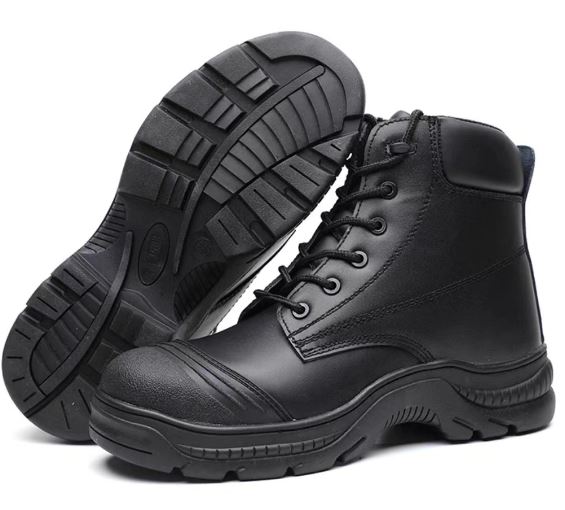Tel: 0129-4001010 Phone: +91 730 321 5033
Email: cs@absoluteveritas.com
BIS CERTIFICATION FOR LEATHER SAFETY BOOTS & SHOES FOR HEAVY METAL INDUSTRIES IS 1989 (PART 2):1986
In today's competitive landscape, maintaining market presence without a certified, high-quality product can be challenging. Obtaining a BIS license may also be essential for selling products in the Indian market. To achieve BIS certification and ensure product quality, manufacturers must adhere to the specified Indian standards.
Lets delve deeper into IS 1989 (Part 2):1986 for leather safety boots and shoes for heavy metal industries.
IS 1989 (Part 2):1986 addresses leather safety boots and shoes tailored for heavy metal industries. This standard (Part 2) delineates the requirements, as well as the sampling and testing methods, for such footwear.
Leather safety boots and shoes intended for heavy metal industries are required to fulfill the design, materials, manufacturing, finishing, and performance criteria detailed in IS 1989 (Part 2):1986. The raw materials utilized in these safety boots and shoes must adhere to the specifications outlined in IS 1989 (Part 2):1986.
The boots must be crafted on lasts that adhere to IS 5520:1969 standards, specifically model numbers 10883 or 9180. These boots should be ankle-high, designed in a Derby pattern, featuring six eyelets and a full vamp. The shoes, also in a Derby design, should have four or fewer eyelets, and be made on lasts compliant with IS 5520:1969, corresponding to model number 10883 or 9150. Both boots and shoes must include a steel toe cap for reinforcement, along with a padded tongue and fully lined vamp. The upper leather should be printed grain leather of any color, meeting the requirements specified in IS 578:1985 as outlined in IS 1989 (Part 2):1986. IS 2051:1976 provides guidelines for drawing representative material samples and establishing conformity criteria.
TESTS
The subsequent test must be conducted for leather safety boots and shoes for heavy metal industries.
-
Impact Test
-
Tensile strength test
-
Performance test
-
Dimensional measurement and any other as specified in the standard
A well-maintained laboratory is necessary for conducting various tests in accordance with the methods outlined in the standard.
Each boot and shoe should bear the manufacturer's name, size number, batch number, year of manufacture, and any other specified information. Additionally, the product may feature the ISI standard mark (ISI Mark), and packaging and labeling should adhere to the standards. Manufacturers are required to obtain a BIS license from the Bureau of Indian Standards to utilize the standard mark (ISI Mark). This license is granted following a thorough assessment of manufacturing infrastructure, quality control and testing capabilities, and production processes.
PROCESS FOR BIS ISI MARK CERTIFICATION

BIS CERTIFICATION PROCESS
Acquiring a BIS license requires a comprehensive review of manufacturing infrastructure, quality control abilities, testing resources, and production procedures. This thorough assessment guarantees that products not only adhere to regulations but also prioritize consumer safety and reliability.
NOTE:
For comprehensive guidance on the BIS ISI Certification process, please explore:
WHY USE ABSOLUTE VERITAS?
Absolute Veritas is a prominent organisation from the private sector of India primarily dealing with the Inspection, Testing, Audits, Certification of products& consulting services to various industries in India and worldwide, ensuring compliance with regulatory standards and industry requirements. Offering a comprehensive range of services including product certification, testing, training, auditing, and compliance services, Absolute Veritas helps manufacturers and importers achieve higher production efficiency and quality standards.
Absolute Veritas (AV) will handle end to end pre-registration request, sample preparation, documentation, testing and application process for FMCS Certification
For any questions regarding the most recent update on FMCS registration licenses, please reach out to us via email at cs@absoluteveritas.com



